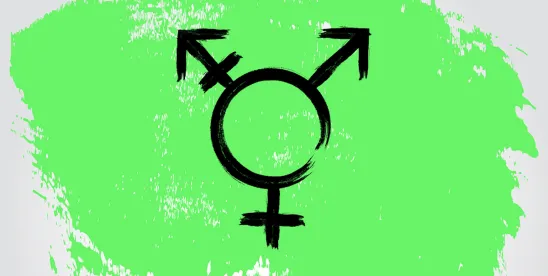Two cases show that courts consider alleged harassment or discrimination based on transgender or cisgender status to be colorable under Title VII of the Civil Rights Act.
Vacating summary judgment for the employer, a federal appeals court has ruled that while an occasional mistake using the incorrect name or pronouns will not create liability, misgendering an employee can be “severe and pervasive” enough to support a claim of hostile work environment under Title VII. Copeland v. Ga. Dep’t of Corr., 97 F.4th 766 (11th Cir. 2024). Misgendering is using pronouns and gendered terms, such as man, woman, guy, and girl, other than the pronouns and the gender identity the employee has specified for them.
In a “reverse” gender identity case, a federal district court has ruled that a cisgender man’s complaint that his transgender coworkers were treated more favorably than he has stated a legal claim sufficient to survive a motion to dismiss. McCreary v. Adult World, Inc., No. 2:23-cv-04332-MMB (E.D. Pa. Apr. 8, 2024). Cisgender means the individual’s gender identity corresponds to their sex assigned at birth.
Copeland v. Ga. Dep’t of Corr.
Tyler Copeland is a transgender man formerly employed as a sergeant at Rogers State Prison in Georgia. Copeland alleged that after he disclosed his transgender identity and requested coworkers use he/him pronouns when referring to him, coworkers purposely called him “baby girl,” “ma’am,” and “her” on prison-wide communications and in front of inmates. Copeland argued that he had a call sign that would typically be used instead of his name or gendered pronouns on communications and that use of gendered language was intentional.
When Copeland informed his employer’s human resources department of his intention to transition his gender, HR allegedly created barriers by requiring more documentation than the law mandated to change their personnel records, as well as harassed him by instructing him to continue to use the women’s restroom and unnecessarily sharing and publicizing his transition. Further, the HR director asked if he “had the surgery,” and at one point an armed coworker followed him to the parking lot without an apparent reason and shoved him, eliciting laughs from coworkers.
Copeland alleged that his coworkers laughed at him, demeaned him, and insulted him from the time he came out as transgender at work. Copeland alleged that the lack of respect and jokes about his gender identity endangered him because his safety at the prison required respect and obedience from inmates.
Regarding Copeland’s hostile work environment claim, the Eleventh Circuit found that Copeland showed the misgendering he experienced satisfied all four factors necessary, including that the treatment was frequent, severe, physically threatening, or humiliating and negatively impacted his job performance. Accordingly, the court vacated summary judgment for the employer and remanded the case for further proceedings. As for Copeland’s claims for failure to promote and retaliation, the court found that Copeland had not shown the necessary causation and affirmed dismissal of the two claims.
McCreary v. Adult World, Inc.
David McCreary was a “Cleaner/Clerk” at one of Adult World’s locations. The location also employed two transgender individuals in the same role. McCreary alleged that the transgender clerks were allowed to arrive late to work, keep the store open past scheduled closing, and one was offered a promotion to store manager within 90 days of their arrival. By contrast, McCreary and other cisgender employees were allegedly not offered similar promotions, disciplined following unfounded and uncorroborated customer complaints, and were terminated with much greater frequency than the transgender employees.
Moving to dismiss, Adult World argued, “Plaintiff’s status as a ‘non-transgender employee’ is not a category protected by Title VII or [the Pennsylvania Human Relations Act].” The court disagreed, finding that “if discrimination based on transgender status necessarily entails discrimination based on sex, then so too must discrimination based on cisgender status.” In the alternative, Adult World argued that because it terminated a cisgender man and a cisgender woman close in time to each other, McCreary could not show the terminations resulted from a discriminatory animus based on sex. The court again disagreed, finding that terminating two employees of different genders, if both were based on considerations related to gender, would double an employer’s potential liability under Title VII, not neutralize it.
The court’s denial of Adult World’s motion to dismiss demonstrates that discrimination based on cisgender identity can support a sex discrimination claim under Title VII.
Implications for Employers
These two cases demonstrate that courts consider any difference in treatment of employees based on their transgender or cisgender identity to be potential grounds for liability under Title VII. Employers must comply with applicable federal and state employment non-discrimination statutes and relevant Equal Employment Opportunity Commission guidance. If an employee approaches HR or a supervisor about a gender transition, it is important that the employer take meaningful steps to accommodate the employee during their transition process. These steps can include: (a) discussing a gender transition plan with the employee in an interactive process; (b) creating a communication strategy informing the staff who work and interact with the employee about the transition and the importance of respect in the workplace and not harassing anyone based on the transgender status; and (c) providing employees the employer’s transgender employment policy on the transition process, the use of proper pronouns, restroom and locker room usage, and so on.
In addition, employers must continue to prevent harassment and discrimination on any basis. Part of that effort should involve robust management training on handling accommodation requests and employee training, including LGBTQ+ training as part of existing anti-harassment and discrimination training. There should also be training for staff to educate them on gender identity, gender expression, the differences between transgender and cisgender and gender non-binary, the difference between sexual orientation and gender identity, and how restroom usage is based on consistent gender presentation, not the gender assigned at birth.
Similarly, consistent with the federal and state employment discrimination laws, employers must honor and respect transgender and non-binary employees’ requests regarding their gender identity and personal pronouns. This includes counseling or taking disciplinary action when other employees repeatedly misgender an employee by referring to them by their incorrect personal pronouns. Employers must respond to allegations of harassment and investigate all complaints regarding gender identity discrimination just as they would allegations and complaints from any other protected class.





 />i
/>i

